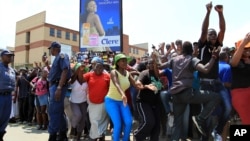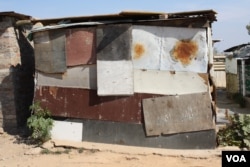A group of young men tremble in fear at the feet of the shouting ringleaders of a mob. A crowd of hundreds bays excitedly for the “scum” to be tortured, to die as painfully as possible. “Show them, show them, show them,” they chant.
The men are accused of being criminals and terrorizing Diepsloot, a dense township north of Johannesburg, where hundreds of thousands of people live, mostly in flimsy shacks and extreme poverty.
The suspects are tied to each other with rough rope. Stripped naked, their dark skins shine with sweat and blood.
A mob ringleader then fills a car tire with gasoline. He puts it around one of the terrified men’s necks, smiles, and strikes a match. The man shrieks as his body bursts into flame.
And so begins a macabre dance. Each jerk of his body spills more burning petrol over him and the men tied to him; each jerk edges him closer to an excruciating death.
Soon, three blackened bodies lie in the dust of Diepsloot. Dogs sniff warily at them. Children wander closer to stare at the deformed corpses.
The footage of the killings was captured by community journalist Golden Mtika.
“It becomes traumatic in fact when you see someone else who is a human being, being killed in such a fashion — being necklaced, pour petrol on top of a person and burning him. It’s not normal, it’s not normal. In a normal society I don’t think people should be doing that,” he said.
But Diepsloot is far from normal, and Mtika’s smartphone is proof of that. It’s a digital house of horrors. It holds video after video of mob murders, most of which remain unsolved, unprosecuted, unreported in the maelstrom of crime that is Diepsloot.
“This brutal stuff happens so much here now that people just aren’t interested in it anymore,” said Mtika. “No one goes to the police to report mob justice. If they do so, they will be killed themselves.”
Mob of women kill shooters
Almost every person one meets in Diepsloot has a story to tell about “mob justice.”
Resident Nkululeko Ncube’s shoes crunch as he leads the way to a stony field of scrub where he said he recently witnessed a vigilante killing.
He explains what “always” happens when community members catch a suspected criminal.
“Some, they burn them … People, they’re taking the law into their hands. I saw them burning another guy. They were accusing him of stealing, but he wasn’t the [guilty] one. It was really terrible. I don’t even want to talk about it because it was very painful,” said Ncube, removing a tattered cap to wipe sweat from his forehead.
Glenys van Halter, who’s been managing community projects in Diepsloot for 20 years, told what happened a few months ago when two “outsiders” fatally shot a local man at a tavern.
“The women in the community gathered around, because they have whistles, so they all blow their whistles and the women come out. And they cornered these two and they murdered them. They beat them to death with rocks and said, ‘Now you come into our community and shoot people and that’s what we do to you.’”
Lack of trust in police
In more footage recorded by Mtika, a crowd hurls bricks that shatter into pieces against an alleged rapist’s head.
Like many Diepsloot residents, Peter Ndlozi said he’s in favor of acts such as this.
“That thing is good because the police [are] not working. I say that thing is good, to fight yourself [against the criminals]. Because when you are going to the police, you are not going to get the help there,” said Ndlozi.
Diepsloot lost faith in the police a long time ago. Many inhabitants repeat: “We call the police to arrest the criminals, but the police never come.”
So, residents say they have to protect themselves by taking their own action against criminals.
Brown Lekekela, a community leader and government-appointed "safety ambassador" in Diepsloot, said, “There is no law in Diepsloot, so people feel they must take the law into their own hands. Criminals rob and assault and rape, and even if the police arrest them, three days later they are back doing the very same things they were arrested for.”
Few resources for pressured officers
Local police officers say mob justice happens because they haven’t got the resources to adequately enforce law and order. The state, citing “operational difficulties,” has failed to staff a huge police station built at a cost of more than 50 million rands [more than $4 million] five years ago in Diepsloot.
There typically are only four police officers patrolling the township.
“There are not enough police officers for the 600,000 people, at least, who live here. And they cannot get into the squatter camps. Once a police vehicle is in there, it can’t get out. It’s impossible for the police to work in much of Diepsloot,” said Lekekela.
The few police officers assigned to Diepsloot are always under severe pressure.
When they fail to make arrests, the community becomes furious and vigilante mobs explode into action.
Zimbabweans blamed for crimes
Diepsloot residents are adamant on who is responsible for most crime in the area.
“Most of the people that are robbing people here in Diepsloot, they are foreign nationals from Zimbabwe. They don’t care. They just kill and batter and do everything to get what they want,” said Lekekela.
Victim after victim points the finger at “Zimbabweans” for the crimes against them — although many of the accused criminals are South African or of other nationalities.
Mtika remembers a crowd cornering a suspected criminal some months back.
“They started questioning him, [asking], ‘where originally are you from?’ So he became scared and he said, ‘I am from Mpumalanga [in South Africa].’ They said, ‘No, you are not talking the truth. You are Zimbabwean and you are a criminal. You are the one that we need…’”
Mtika watched as the man ran for his life, pursued by the mob. Then he fell.
The reporter’s phone recording of the incident shows people laughing and whistling as mob ringleaders beat the man with rocks and chains.
Soon afterwards, in another desperate bid to escape, he falls into a ditch of dirty water.
“After a few seconds they pulled him out,” Mtika continues. “There was this other old man who took a wooden plank and hit him on the head seven times, cracking his brain. And this young little girl, in between the age of 14 or 15, she had a rock, and she just threw it on top of his brain.”
A policeman said that like many mob justice victims in Diepsloot, the Zimbabwean man was innocent of the crimes he was accused of committing.
“He was just in the wrong place at the wrong time with the wrong look on his face and with a Zimbabwean name in the ID [identity] book in his pocket,” said the officer.






